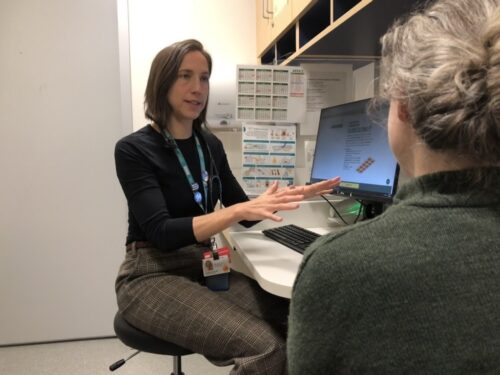
Boston Medical Center
Recovery Field Day in Boston Common, 2022.
"It's frustrating…that we have the tools to be able to offer people what they need but…we have systems that are restricting the…care that people deserve."
An estimated 107,500 individuals lost their lives to a drug overdose between July 2021 and July 2022, with more than 81,000 of those deaths attributed to opioids and, in particular, fentanyl. To better understand the crisis and put forth suggested policies to reduce harm and further deaths, the Centers for Disease Control and Prevention called forth an addiction expert panel in January. Boston Medical Center’s Sarah Bagley, MD, a primary care physician who focuses on addiction joined fellow addiction medicine experts in providing insights and possible solutions to the current overdose epidemic.
One of the crucial points that Bagley raises is that patients still face a plethora of obstacles when it comes to accessing methadone, one of the most effective treatments for opioid use disorder (OUD). Fentanyl provides unique challenges for providers. Because of its potency, those who use fentanyl have to start their methadone treatment at a much higher dose to achieve the goal of suppressing opioid withdrawal. The chemical challenges in reaching that goal can leave many patients frustrated by the lack of progress, and that frustration can lead to disengagement with care, and therefore becomes an additional barrier to treatment. Given the link between fentanyl and overdose-related deaths, the consequences can be dire. She stresses the need for community involvement in addiction care.
Sarah Bagley, MD
“One thing that we have seen with fentanyl is a lot more challenges with inductions in outpatient settings. It used to be that we could start someone on buprenorphine if they were in moderate withdrawal, which would usually be within a day of their last use. What we’re seeing is that this approach is less effective among patients who are using fentanyl… There are so many great clinicians and scientists across this country trying to figure out what the right protocols are, but right now there is no standardized approach. I think the fact that we have different ways of doing it tells us that we have a lot to learn.
Access to methadone remains a significant problem. There are parts of the country, including here in Massachusetts, where there are methadone clinics, but there are delays and obstacles for patients seeking treatment. That’s just not good enough…It’s so frustrating to know that we have the tools to be able to offer people what they need but that we have systems that are that are restricting the compassionate, nonpunitive care that people deserve…
[Substance use disorder] does require the community to come together because it does touch so many different sectors in our communities. As you engage different people, who will naturally have different perspectives, and lean into training and new ways of thinking about problem solving, it can lead to some powerful solutions.”


